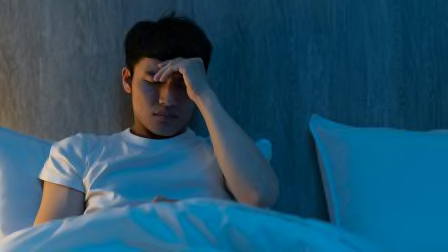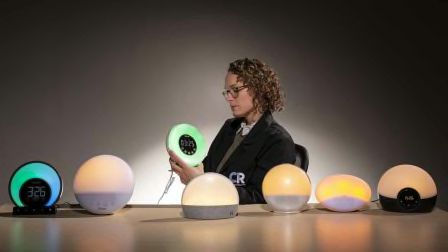Having Trouble Staying Asleep?
5 strategies to help you fix frequent nighttime awakenings

Americans spend over $40 billion on sleep aids each year, but the struggle for a good night’s rest is still elusive: 80 percent of all Americans report problems with sleep at least once a week, according to a 2018 Consumer Reports survey of 1,767 U.S. adults.
And surprisingly, the most common problem people face isn’t falling asleep—it’s staying asleep.
Almost 50 percent of Americans reported trouble staying asleep, meaning they wake up at least once in the middle of the night and then have difficulty nodding back off again.
“There are a lot of reasons why someone may have trouble staying asleep—everything from an undiagnosed health condition such as sleep apnea to simply feeling stressed,” says Tina Waters, M.D., a sleep specialist at the Cleveland Clinic.
An occasional 3 a.m. awakening is nothing to worry about, but if you’ve been waking up in the middle of the night at least once a week for over a month, then you should make an appointment with your primary care physician, she advises.
Chronic insomnia has been linked to a slew of health problems, including increased risk of anxiety, depression, weight gain, heart disease, and type 2 diabetes.
Here, five ways to address frequent middle-of-the-night wake-ups.
Check for Medical Issues
If you find that you generally seem to fall asleep readily, but later wake up and have trouble going back to sleep, the culprit may be an undiagnosed health condition.
“Oftentimes, mild sleep apnea that only occurs during REM sleep can lead to frequent night awakenings,” says Lois Krahn, M.D., a sleep specialist at the Mayo Clinic in Phoenix. Symptoms such as waking up with a racing heart or gasping for breath are sometimes attributed to anxiety, but they can also be due to sleep apnea, she adds.
Try to Stay Calm When You Wake Up
Easier said than done. But if your insomnia isn’t due to a medical condition, then the cause may be what’s called psychophysiological insomnia, says Krahn. This type of insomnia happens when you wake up and become so stressed about not falling back to sleep that your worry ends up keeping you awake.
The best way to cope if this happens is to stay exactly where you are. “A lot of my patients think that they’re supposed to go into another room and do something relaxing like reading until they feel sleepy again, but that really only works if you’re having trouble falling asleep,” explains Krahn. “I’ve found that just the act of getting up and moving around can send the body into wake-up mode.”
Instead, she recommends listening to soothing music, or even a boring podcast, in the dark in your bed until you feel tired again. Don’t grab your phone, even just to check the time—these devices emit blue light, which suppresses melatonin and may make it harder for you to fall back asleep.
Practice Good Sleep Hygiene
If you’re worried about falling and staying asleep, you may be tempted to have a nightcap or two to make it easier to drift off. But while alcohol can make you feel sleepy, it can contribute to middle of the night awakenings after its effects wear off, explains Krahn.
You should also avoid caffeine as much as possible, especially in the afternoon and evening. And consider eating a light, low-fat, fiber-rich dinner: one small study found that folks who did so reported better sleep quality than those who ate a larger, fattier dinner.
Try to go to bed and get up at about the same time each day to get your body used to a fixed sleep schedule. And make sure that you’re getting at least 150 minutes of exercise a week; regular physical activity has been linked to sounder sleep.
Consider Cognitive Behavioral Therapy (CBT)
It’s now considered the gold standard for treating insomnia, says Harris. Groups like the American Academy of Sleep Medicine recommend it over sleep drugs as a first-line treatment for chronic insomnia, and cognitive behavioral therapy for insomnia (CBT-I) is often covered by insurance.
Certain sleep clinics offer CBT; find one accredited by the AASM here. You can also find a therapist who specializes in sleep disorders through the Association for Behavioral and Cognitive Therapies.
Avoid Sleep Meds
Both over-the-counter and prescription sleeping medications can carry health risks if they’re used long term, says Krahn.
Over-the-counter sleep aids such as diphenhydramine (Benadryl Allergy, Sominex, and generic) or doxylamine (Unisom and generic) have been shown to affect cognitive ability in older adults, and long-term prescription sedatives have been linked to increased risk of cancer and death.
These should only be used short-term, under the supervision of a doctor—and even then only sparingly. “Generally, I consider them safe to use if I prescribe them short term, for two to three months while we’re getting a patient’s insomnia under control,” says Andrew Varga, M.D., a sleep medicine specialist at the Mount Sinai Hospital in New York. “But they’re a temporary fix, not a permanent solution.”
(For more about sleeping pills, see “The Problem With Sleeping Pills.”)




















